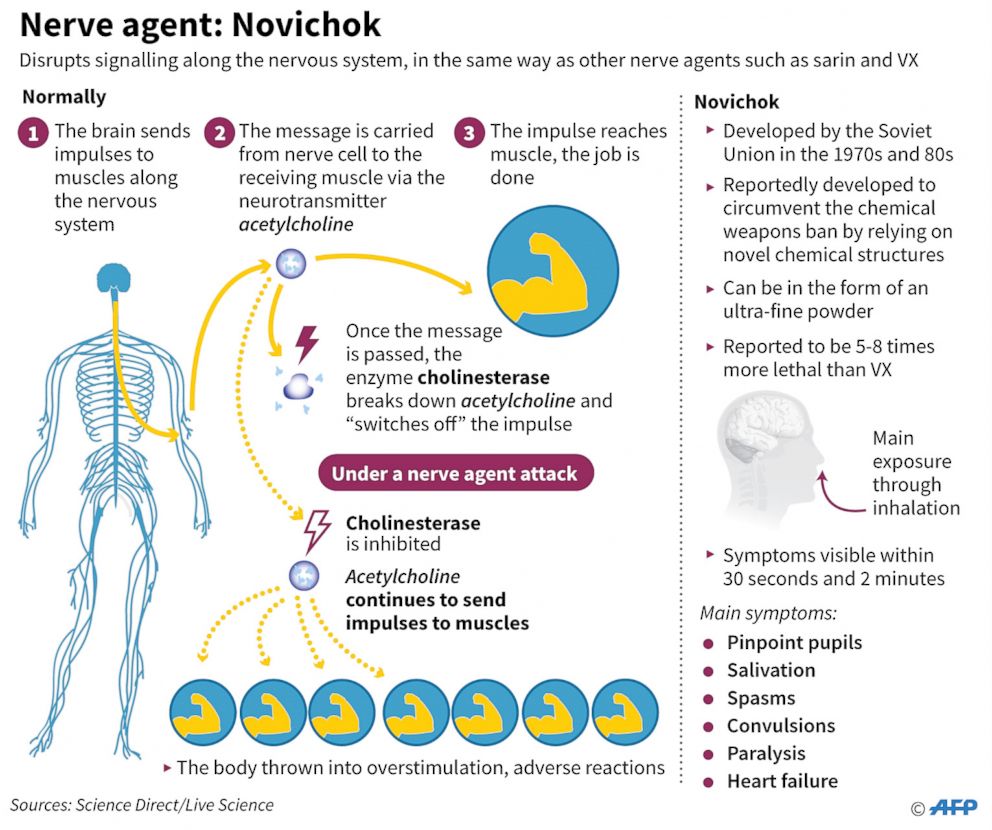UK seeks allies' support after former Russian spy, daughter poisoned with nerve agent
Authorities say Skripal, daughter likely given nerve agent developed by Russia.
SALISBURY -- Britain is weighing its options and rallying support from allies across the West, a day after Prime Minister Theresa May issued an ultimatum saying Russia needed to provide answers to how former double agent Sergei Skripal was poisoned.
Speaking to Parliament Monday, May said authorities believed Skripal and his daughter were attacked with a "military-grade nerve agent, of a type developed by Russia."
The nerve agent is believed to belong to a group of Soviet-era chemicals called "Novichok."

May gave Moscow until midnight on Tuesday to explain how Skripal was attacked, or how it may have lost control of its own nerve agent.
"Should there be no credible response," she said, "we will conclude that this action amounts to an unlawful use of force by the Russian State against the United Kingdom."
Describing the attack on the Skripals as a possible "unlawful use of force" may pave the way for the British government to invoke Article 5 of the NATO treaty, which states that an attack on one member state is an attack on all.
Other options that have been discussed by British parliamentarians and commentators include expelling diplomats and spies from the U.K., suspending the U.K. license of Russian broadcaster Russia Today or a boycott of the 2018 World Cup by the English team or delegation.
The Prime Minister attended a national security meeting chaired by Home Secretary Amber Rudd, the third such high-level meeting since the Skripal incident more than a week ago.
The council will reconvene Wednesday following the expiration of May’s deadline to Moscow, to discuss next steps.
Following renewed interest in the deaths of 14 Russians in London, also the focus of a previous investigation by BuzzFeed News, Rudd said in a letter on Tuesday that the police and MI5 would be looking into the cases to rule out any possible Russian involvement.
"In the weeks to come, I will want to satisfy myself that the allegations are nothing more than that," Rudd said.
Most deaths on the list, which includes prominent criticis of the Kremlin such as Boris Berezovsky and Alexander Perepilichny, were ruled as non-suspicious.
The British have also summoned the Russian Ambassador, Alexander Yakovenko, to the Foreign Office to provide an explanation.
Some allies across the West have responded to May's call. Foreign Secretary Boris Johnson said he had been "encouraged" by the response from diplomatic allies, especially following conversations with French President Emmanuel Macron, German Foreign Minister Sigmar Gabriel and U.S. Secretary of State Rex Tillerson.
Following a phone conversation with Johnson, Tillerson told reporters, "This is a really egregious act. It appears that it clearly came from Russia ... It certainly will trigger a response."
Tillerson added that he did know yet know whether the attack was carried out with the Kremlin’s knowledge.
Leading European diplomat Guy Verhofstadt, who has frequently criticized the U.K. government over its handling of Brexit, also expressed solidarity with Britain.
"We stand shoulder to shoulder with the British people," he said. "It must be made clear that an attack against one E.U. and NATO country is an attack on all of us."
Tuesday morning, the British Ambassador to Russia, Laurie Bristow, was called to the Foreign Ministry, according to local news agencies. At a news conference, the Russian Foreign Minister Sergei Lavrov repeated that Moscow bears no responsibility for the attack, adding that Russia has requested access to the nerve agent that was used to attack the Skripals.
Meanwhile, the Metropolitan Police announced they are investigating the sudden and "unexplained" death of a man who is widely believed by British media to be Nikolai Glushkov, a Russian exile and close friend of the late Boris Berezovsky.
The Met said in a statement that the Counter Terrorism Command is leading the investigation "as a precaution because of associations that the man is believed to have had."
Currently, the statement added, there is no evidence to suggest a link to the Salisbury incident.
The Russian Foreign Ministry appeared to mock the British Prime Minister’s words in Parliament on Monday. On its social media accounts, the Ministry pushed the hashtag "HighlyLikelyRussia" mocking May’s assertion that it was "highly likely" that Russia was responsible for Skripal’s poisoning.
So far, the reaction from Moscow to the British ultimatum has been to denounce the allegations as an invention meant to smear Russia.
There is little sign from officials or state media that the country is prepared to acquiesce to demands that it provide access to its Novichok nerve agent program, or provide the "credible" response explaining how the poison came to be used on the streets in Salisbury.
The former Russian spy, 66, and his daughter Yulia, 33, were found unconscious on a bench in the center of Salisbury on March 4. They are currently being treated in a city hospital and are said to be in critical, but stable condition.
ABC News' Patrick Reevell contributed to this report from Moscow.




